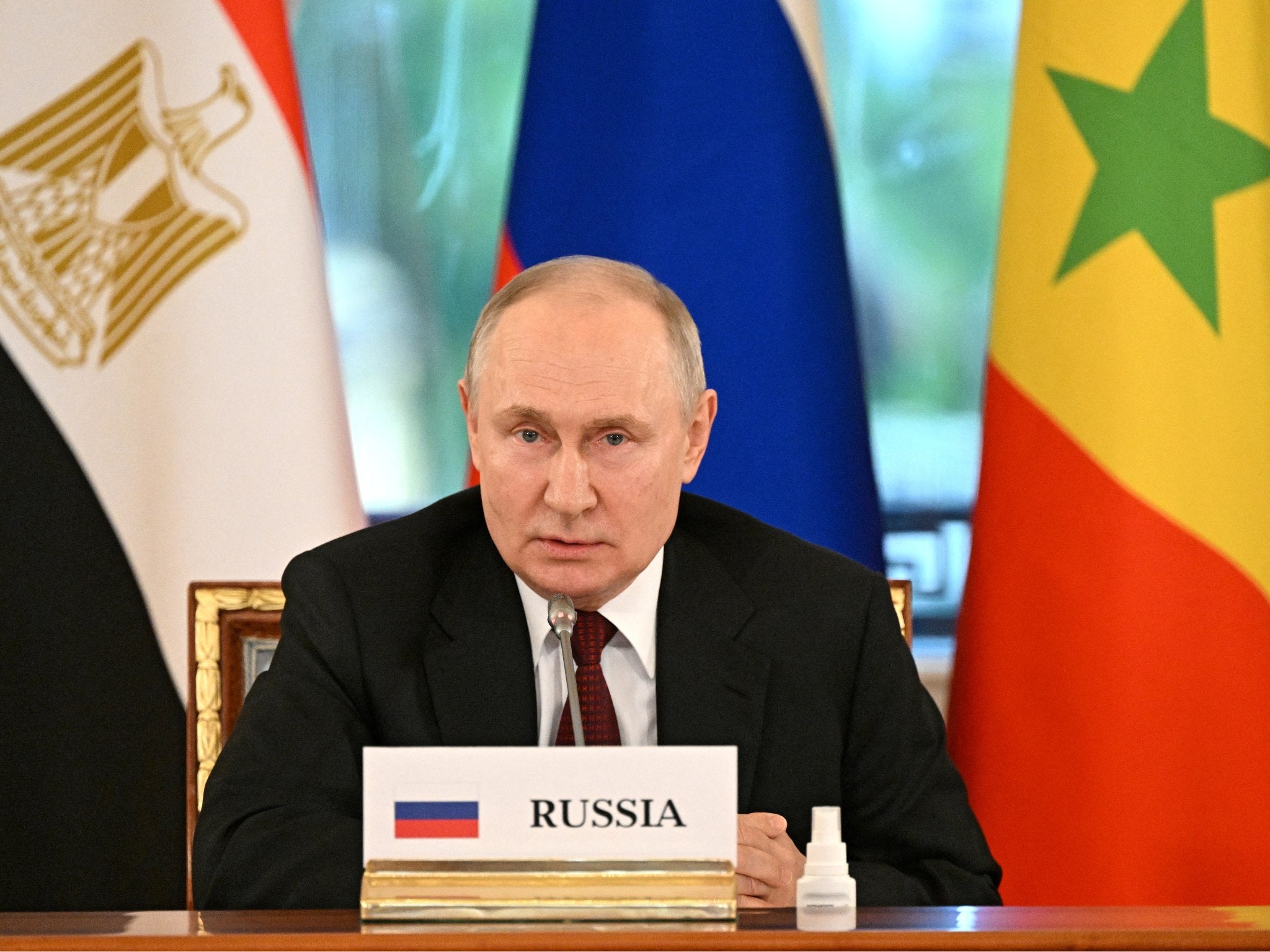Putin lectures African leaders seeking peace in Ukraine – as they tell him war must end
The delegation – including representatives from Senegal, Egypt, Zambia, Uganda, the Republic of Congo, Comoros and South Africa – met with Ukraine’s President Zelensky on Friday

Your support helps us to tell the story
From reproductive rights to climate change to Big Tech, The Independent is on the ground when the story is developing. Whether it's investigating the financials of Elon Musk's pro-Trump PAC or producing our latest documentary, 'The A Word', which shines a light on the American women fighting for reproductive rights, we know how important it is to parse out the facts from the messaging.
At such a critical moment in US history, we need reporters on the ground. Your donation allows us to keep sending journalists to speak to both sides of the story.
The Independent is trusted by Americans across the entire political spectrum. And unlike many other quality news outlets, we choose not to lock Americans out of our reporting and analysis with paywalls. We believe quality journalism should be available to everyone, paid for by those who can afford it.
Your support makes all the difference.Russian President Vladimir Putin interrupted opening remarks by African leaders seeking peace in the Ukraine conflict to deliver a list of reasons – including his tried-and-tested tactic of blaming the West – as to why he claims many of their proposals are misguided.
Mr Putin first welcomed the presidents of Comoros, Senegal, South Africa and Zambia, as well as Egypt's prime minister and top envoys from the Republic of Congo and Uganda to the 18th-century Konstantinovsky Palace on the southern shore of the Gulf of Finland. He stressed Russia's commitment to the continent. But after presentations from the Comoran, Senegalese and South African leaders, he stepped in to challenge the assumptions of the plan before the round of comments from all the representatives could go any further.
South African President Cyril Ramaphosa told Mr Putin: "The war cannot go on forever. All wars have to be settled and come to an end at some stage," he said. "And we are here to communicate a very clear message that we would like this war to be ended."
Mr Putin reiterated his position that Ukraine and the West had started the conflict long before Russia sent its armed forces over the border in February last year. He said the West, not Russia, was responsible for a sharp rise in global food prices early last year in the wake of Moscow’s invasion.
He told the delegation that Ukrainian grain exports from Black Sea ports that Russia has permitted for the past year were doing nothing to alleviate Africa's difficulties with high food prices because they had largely gone to wealthy countries. He said Russia had never refused talks with the Ukrainian side. But Moscow has never sought them either.
The African plan includes a call for all children caught up in the conflict to be returned to where they came from, but Mr Putin said Russia was not preventing any Ukrainian children from returning home. "We took them out of a conflict zone, saving their lives," he said.
The African leaders are seeking agreement on a series of "confidence building measures" even as Ukraine last week began a counteroffensive to push back Russian forces from Ukrainian territory they occupy.
Mr Ramaphosa laid out the 10 points of the African initiative, after Comoros President Azali Assoumani, current chairman of the African Union, told Mr Putin: "We've come here to listen to you, and through you the Russian people, and encourage you to enter negotiations with Ukraine in order to put an end to the difficult ordeal.
"We gave ourselves this mission because, as Africans, unfortunately, we have had to manage numerous conflicts, and it's through dialogue and negotiations that we have succeeded at resolving them."
Ukrainian President Volodymyr Zelensky had said after meeting the leaders in Kyiv on Friday that peace talks with Russia would be possible only after Moscow withdrew its forces from occupied Ukrainian territory.
He added that he could not understand what could be gained from the delegation meeting Mr Putin.
Mr Putin said Russia was "open to constructive dialogue with anyone who wants to establish peace on the principles of fairness and acknowledgement of the legitimate interests of the parties".
However, Russia has said repeatedly that any settlement must take account of "new realities", meaning its declared illegal annexation of a number of Ukrainian provinces, four of which it only partially controls.
Reuters
Join our commenting forum
Join thought-provoking conversations, follow other Independent readers and see their replies
Comments